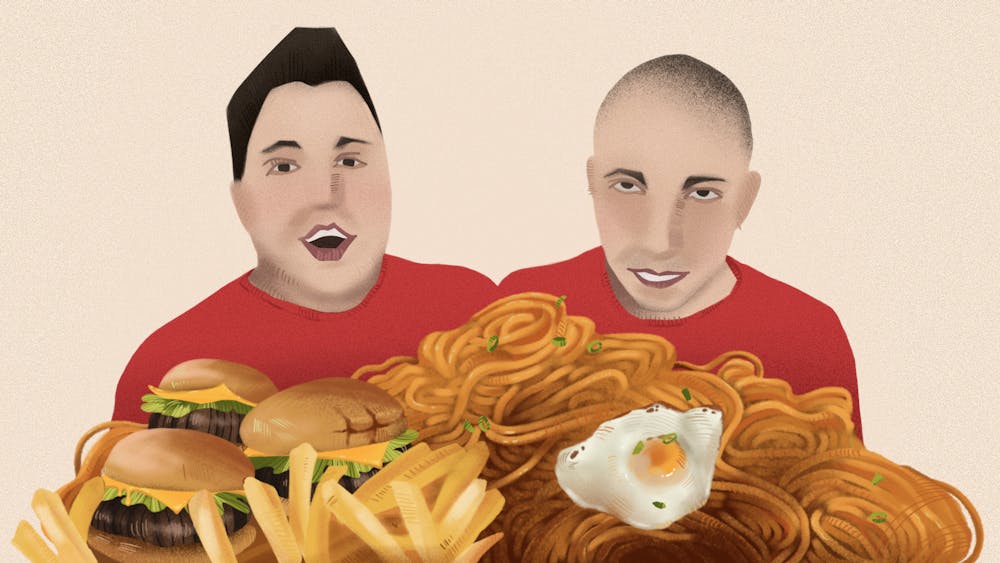You’ve probably seen his videos before. Or, if not his videos, you’ve definitely seen his wild YouTube thumbnails. Grotesque and provocative, featuring copious amounts of neon–colored foods in unholy combinations—think blue Takis mixed with mayo and instant ramen—and close–up shots of theatrical facial expressions. Images like these are snapshots into the chaotic world of Nikocado Avocado, the YouTuber whose videos have racked up millions of views while changing our perception of internet fame.
Most recently, Nikocado Avocado, whose real name is Nicholas Perry, made headlines with a video simply titled “Two Steps Ahead.” The video, which racked up 45 million views in two weeks, features a dramatically different Perry. It reveals what he essentially describes as a yearslong social experiment; the past two years of outrageous content had been strategically prerecorded, and “Nikocado Avocado” was an internet persona who didn't really exist.
While the internet had been tricked into thinking Perry had been overeating Cheeto–flavored noodles in impossible amounts, he had actually been undergoing a 250–pound weight loss transformation. Perry says his intention was to draw the public’s attention to the pitfalls of internet overconsumption. So far, he’s been successful. Nikocado Avocado’s stunt and his entire social media career have much to tell us about dangerous food trends, social media spectacle, and the costs of online stardom.
You wouldn’t believe it from watching his videos, but Perry started social media as a vegan influencer. His YouTube content centered around vegan lifestyle vlogs up until 2016, when he denounced veganism in a video that marked a fundamental shift in his career. It was from there that Perry pivoted to the kind of content that would go on to bring him his internet fame—shocking versions of what are known as mukbangs.
Mukbangs originated in South Korea. The term “mukbang” translates to “eating shows” and refers to a genre of videos where creators post themselves eating excessive amounts of food. The videos emerged as remedies to what studies show is a modern epidemic of loneliness; by eating alongside mukbangers, those who would have otherwise eaten alone gain a source of online company.
Now, enter Nikocado Avocado, who transformed the genre through controversy and infamy. Through creating videos that purposely provoked his audience, Perry found a dangerous strategy for obtaining internet fame. His videos capitalize off of rage baiting—an increasingly popular social media phenomenon where influencers post content aimed at inciting anger and, subsequently, online engagement from viewers.
Dramatic meltdowns, obscene amounts of junk food, and brazen behavior have all become key parts of Perry’s former online identity. The result is unremitting attention from dedicated fans, critics, and media outlets alike. Perry’s videos consistently receive millions of views and thousands of comments. Online reaction videos in which users express disdain, hatred, and concern for Perry populate virtually every social media channel. As viewers continue to engage with his content out of shock and disbelief, Perry shows that he has mastered a cycle of negative attention that social media algorithms favor.
Perry is not the only one using online controversy to his advantage. His Nikocado Avocado character reflects a growing trend in content creation, one where influencers use scandalous, embarrassing, or enraging behavior to gain visibility. Most recently, TikTok creators such as Louisa Melcher have gained attention through skits that feature falsified stories meant to pique viewers’ attention. Melcher’s videos feature titles like “How I got fired as an influencer’s babysitter” and “My randomly assigned roommate is my ex.” While tactics like these have successfully garnered fame, it is also worth questioning if profiting from toxic behavior can cause potential long–term harm to creators and viewers.
Perry’s influence is visible in the mukbang community. Many creators have copied his model, filming themselves grotesquely consuming unhealthy food for views. Jellybean.Sweets is one emerging mukbanger whose recent rise to infamy mirrors Perry’s. Her stunts, which involve consuming copious amounts of fast food takeout in single sittings, have sparked debate over the risks of controversy–seeking influencer media.
Audiences themselves have begun to notice how these styles of videos have normalized toxic actions. This issue comes to light especially as two mukbangers passed away in 2024 as a result of their overeating. The tragic deaths of the creators, Pan Xiaoting and Dongz Apatan, highlight the potential deadliness of turning harmful behaviors into entertainment. They also raise discourse on the role of viewers in encouraging this kind of content, whether intentional or not.
The Nikocado Avocado persona—and Nicholas Perry’s recent reveal—show us that the Internet rewards controversy. Social media trends have fostered a space where influencers are able to manipulate their audiences’ attention with manufactured scandal and spectacle. As content creators’ alarming tactics are rewarded with clicks and engagement, the lines between entertainment, harm, and exploitation grow increasingly blurred. As social media influencers continue to chase fame using the method that Perry pioneered, we are brought to consider the question: How far is too far?

